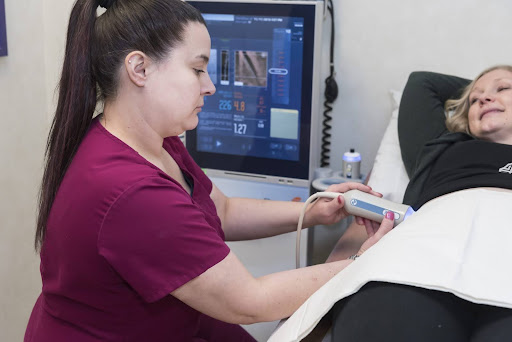Albany Gastroenterology Consultants Has Joined Allied Digestive Health, a Leading Gastroenterology Provider Network
Fibroscan is a non-invasive test that helps assess the health of your liver. Specifically, it uses ultrasound technology to determine the degree of fibrosis or scarring that may be present in your liver from various liver diseases or conditions. This information is then used by your gastroenterologist to individualize and optimize your treatment plan. For some patients, Fibroscan can replace liver biopsy.
FibroScan test results are always used in conjunction with other clinical data, laboratory test results, and liver imaging in managing individual patients.
Patients are asked to wear loose clothing and should be able to lie flat on an exam table for 10 minutes or more while the test is being performed. Patients are asked not to consume any liquids or solids for a minimum of 3 hours before the test to increase the likelihood of obtaining reliable test results. The scan typically takes 10 to 15 minutes to complete, but patients should plan on being here for 30 minutes to allow time for preparation.
The liver is located in the right upper abdomen under the rib cage. Patients are asked to lie flat on an examination table. A technician places the FibroScan probe between the ribs on the right side of the lower chest wall. A series of painless pulses are then applied to the liver. The results are recorded on the equipment and an overall liver stiffness score is generated. This score is then interpreted by a qualified physician to predict the likelihood of advanced fibrosis or cirrhosis.

It is not necessary to bring a driver for your liver elastography appointment. After the procedure, you will be immediately discharged from the procedure area and be able to leave without any restrictions. The doctor who completed and interpreted the procedure will send the test results to the doctor who ordered your procedure. FibroScan results will be available in about one to two weeks.
The FibroScan test is a completely non-invasive, simple and painless procedure that takes approximately 10 minutes to complete. Most patients with chronic liver disease can be assessed, but the test is not recommended or interpretable in patients with:
St. Peter’s Hospital
Albany Medical Center
Ellis Hospital
Samaritan Hospital – Albany Memorial Campus
Southwestern Vermont Medical Center